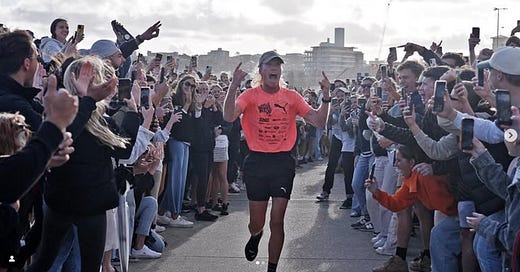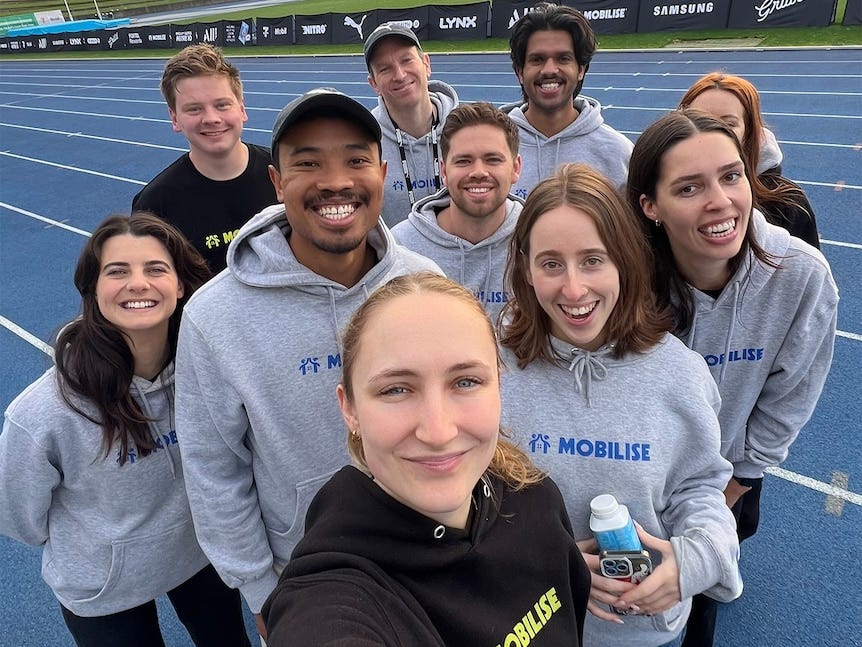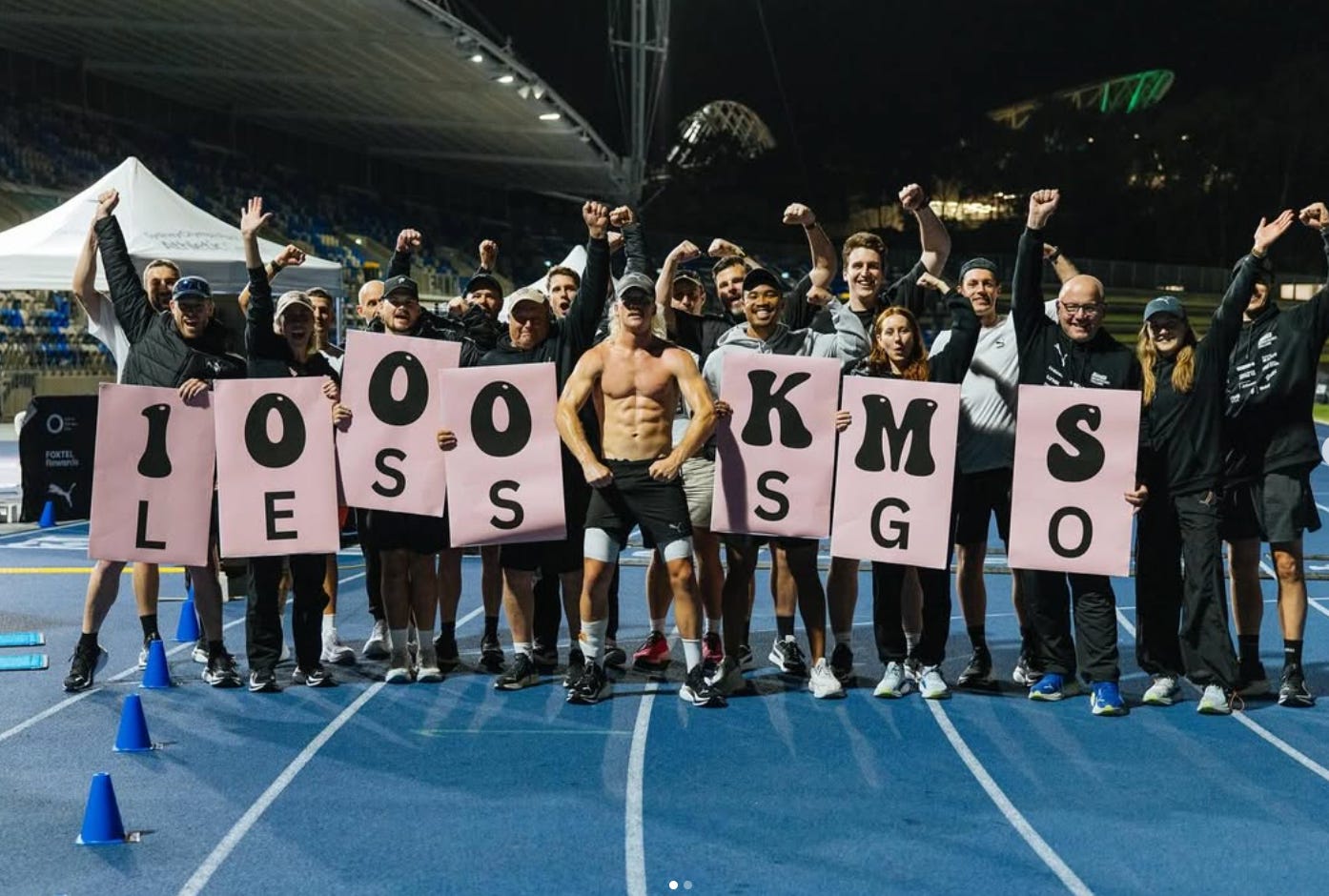The cult of charity: Where did Nedd Brockman’s millions go?
One man’s run raised a fortune – but for whom?
A couple of years ago a young bloke called Nedd Brockman did something pretty remarkable. He ran a staggering 4,000 kilometres from Cottesloe to Bondi Beach in just a bit over 46 days.
His goal had been to break the world record, but Nedd was just a few days short. No one much cared. When Nedd arrived at a finish line of his own making, gaunt, in pain, and suffering from numerous injuries, thousands of people greeted him like a hero.
It was an undeniably inspirational story. Nedd wasn’t an athlete or a celebrity, just a young sparky with a glorious mullet who wanted to do something great.
Even better, Nedd was supporting a cause. He used the run to raise money for the homeless. If Nedd had a specific vision for what that meant, or how those funds would help the problem, he didn’t elaborate.
We Are Mobillise, a small charity startup run by a few well-meaning people in their mid-20s were the lucky recipients of Nedd’s support. Part of the appeal of raising a large sum of money for this charity, Nedd said, was that they were a small group — “I knew it could be mind-blowing for them.”
I’m sure it was.
Before Nedd came along, We Are Mobilise had 14 volunteers and just $11,000 of revenue in the 2022 financial year. They didn’t need much more. As their website said, their goal was “not to provide food or money, but conversations held in the spirit of curiosity and empathy”. It was human connection, they thought, that the homeless population was missing.
This very small, very niche charity found themselves to be the recipients of an enormous windfall.
Thousands of Australians, inspired by Nedd’s run, donated a staggering $2.4 million dollars. Why? To show their support for Nedd and his cause. No further investigation needed.
That’s the problem with good news stories – nobody really wants to look under the hood.
Even a cursory scan of We Are Mobilise would have revealed they were not prepared – on any level – to be the administrators of such a large sum of money. And why should they be? These were young people dealing in empathy and chats, not trying to solve the profoundly complex systematic failures which lead to homelessness.
When I last looked into We Are Mobilise, their reports only ran up to June 2023. At that point they’d only briefly been in possession of the donations, and had spent just $250k. That money went to staff salaries, marketing and professional expenses. Only $5,000 made its way to the people it was intended to help.
I doubt anyone would wish for their donation to go towards the noble cause of marketing. But it’s naive to think that charities aren’t run a little like businesses. With enough time, I had hoped, We Are Mobilise would work towards redistributing the funds where they’re most needed.
Last week We Are Mobilise dropped their 2024 financial year annual report. It’s a document I’ve been eagerly awaiting. They’d had more than a year to work out what to do with the donations. So where has the money gone?
Firstly, staff salaries more than tripled from $169,00 up to $585,000. This is to be expected. People deserve to be paid for their work, and with 11 full time staff members, this is still a relatively small sum.
But then another $215,000 went towards marketing and building a ‘brand identity’. The wording of the annual report reads as though it’s pre-empting any outrage on this expense. “By spending $215,000 in advertising and marketing in FY24, we saw a significant return, and ultimately our ability to distribute to a greater amount to participants,” it says.
Well, great. Let’s talk about the program participants. How many of them are there, and what have they received? According to We Are Mobilise’s reports, just 154 people were helped with rental assistance, bills, transport, and wellbeing. This came to $254,000, less than 20% of their total expenditure.
They promise there is more to come. We Are Mobilise says their ultimate goal is to “positively impact the lives of 10,000 people by 2030”. What precisely does ‘positively impact’ mean? You’ll find no clear answers on their nicely-branded website. This is marketing slop disguised as a metric.
Frankly, Australia does not need another homeless charity. Everytime a new entity enters this space, the available resources splinter, and it gets harder to run existing programs. The money spent establishing We Are Mobilise (employing staff, setting up their programs, and building a brand) could have had an immediate effect if it were placed with an existing group.
Take Sanctuary Housing, for example. They currently run three refuges that provide emergency accommodation for women and children fleeing family violence.
Last year Sanctuary Housing ran on just $85,000 in donations – a fraction of what Nedd Brockman rustled up on his run across Australia. Somehow, with no paid staff and this paltry amount of money, they still managed to help more than 1,200 people last year. They say that at any given time there are around 100 people in their emergency accommodation.
The women whom this charity helps are often facing both violence and the prospect of homelessness. We know how grim the domestic violence statistics are in this country. But Australia’s shelters are underfunded and overloaded – they constantly have to turn desperate people away.
It’s hard to quantify what $2.4 million would have done for a charity like Sanctuary Housing. But it sure as hell would have been more than giving 154 people a few short-term cash injections.
Just recently, Nedd did another gruelling run and managed to raise a further $4 million for We Are Mobilise. His goal is to eventually reach $10 million. This is a man clearly setting out to do good; that is a laudable endeavour. But with sums of money this large, intentions alone are not enough.
When people donate to charity, they’re making an emotional decision. Sometimes they want to be part of a movement as much as they want to make a difference. Ned and We Are Mobilise have managed to capture this energy and sense of purpose better than many established groups. But the ability to raise money does not necessarily translate into being able to effectively use the money. Perhaps they’ll learn eventually.
In the meantime, homeless shelters would really like to stop turning desperate people away from emergency accommodation.
Maybe sling them some money instead.
Donate to Sanctuary Housing
Donate to Wayside Chapel







There is serious suspicious in the running community in Australia and the United States whether it was even a legit run. It was very similar to Robert Young's infamous 'run' across America for 'charity'. Lots of whiff around the whole affair!
I often wondered how this amazing amount of money was distributed. Ned hatched such a great plan and his sole effort generated an awesome amount of money.